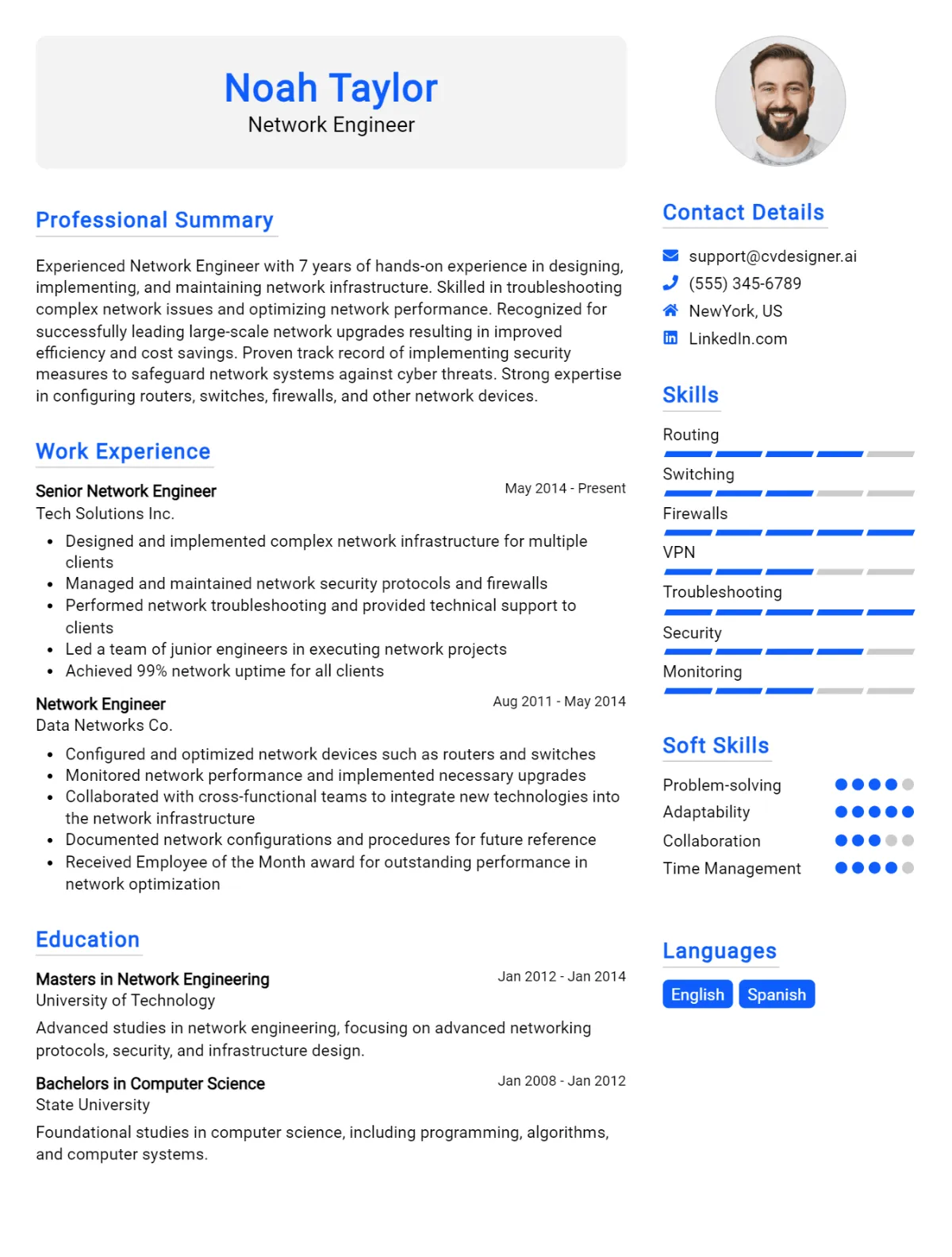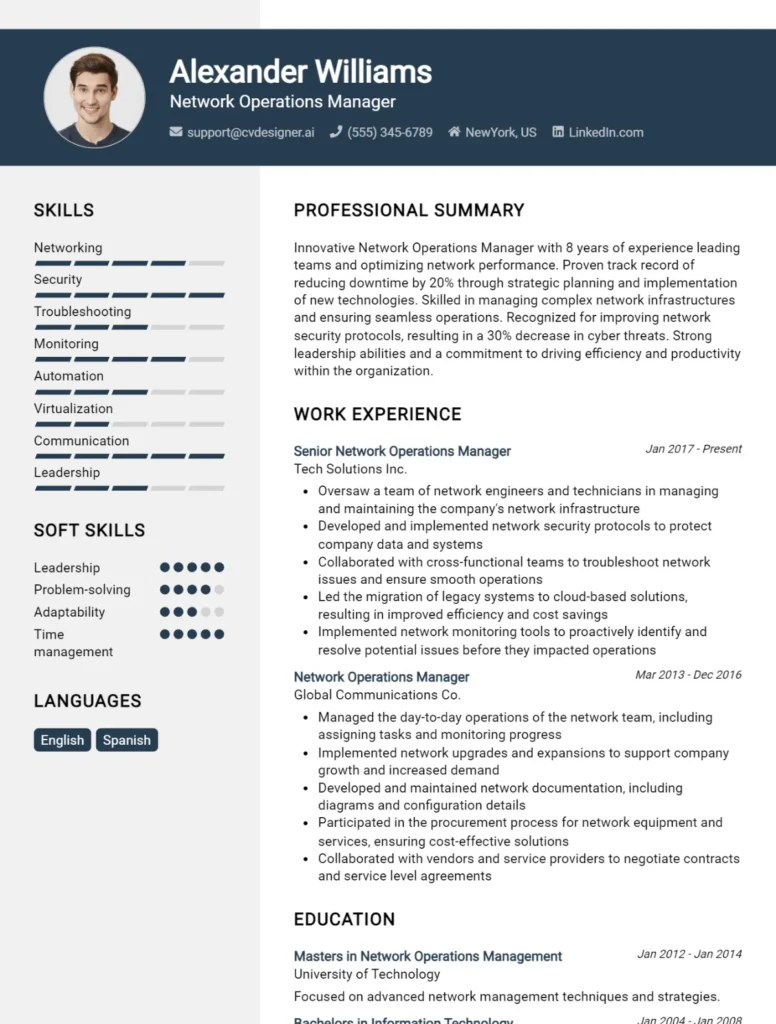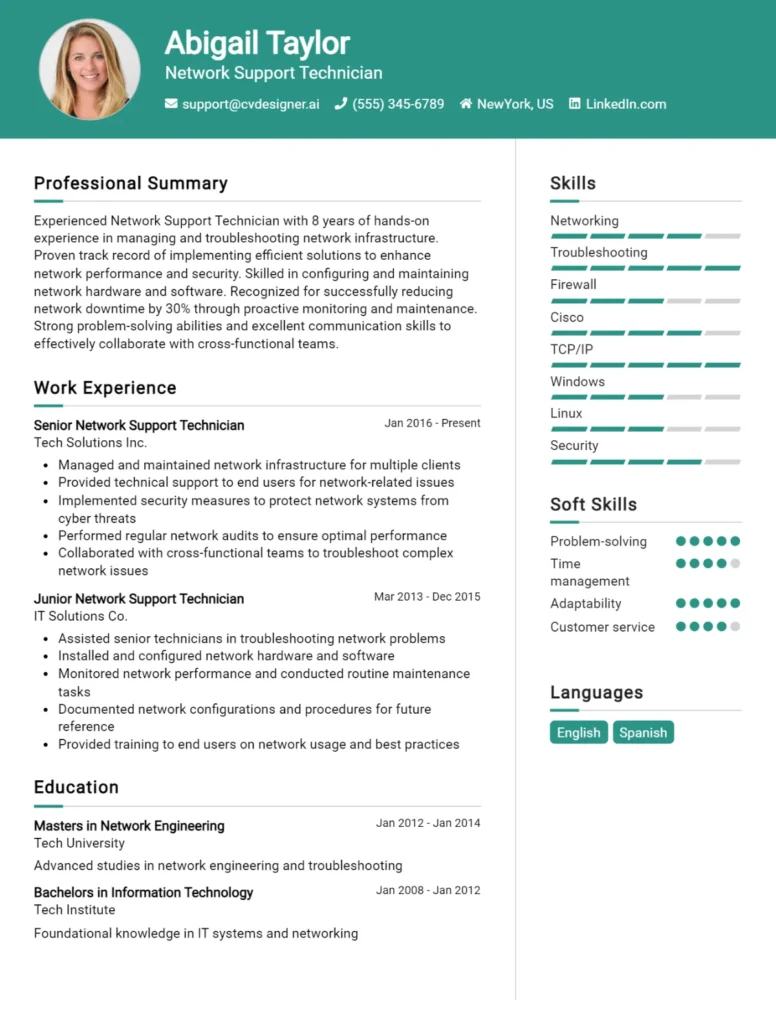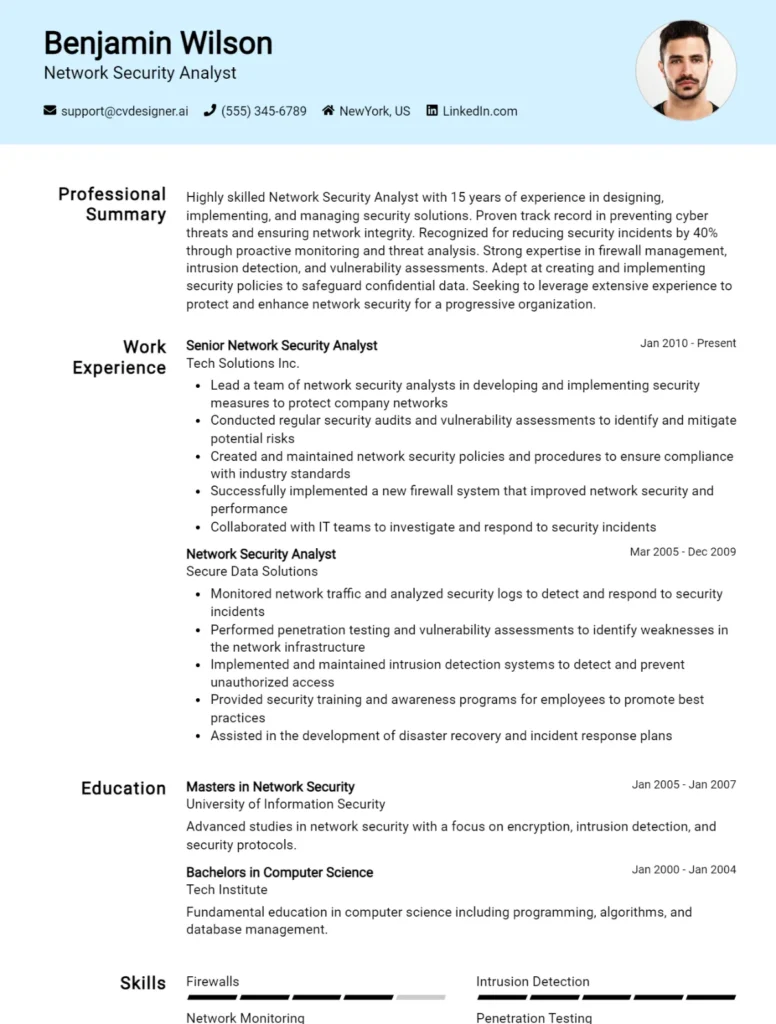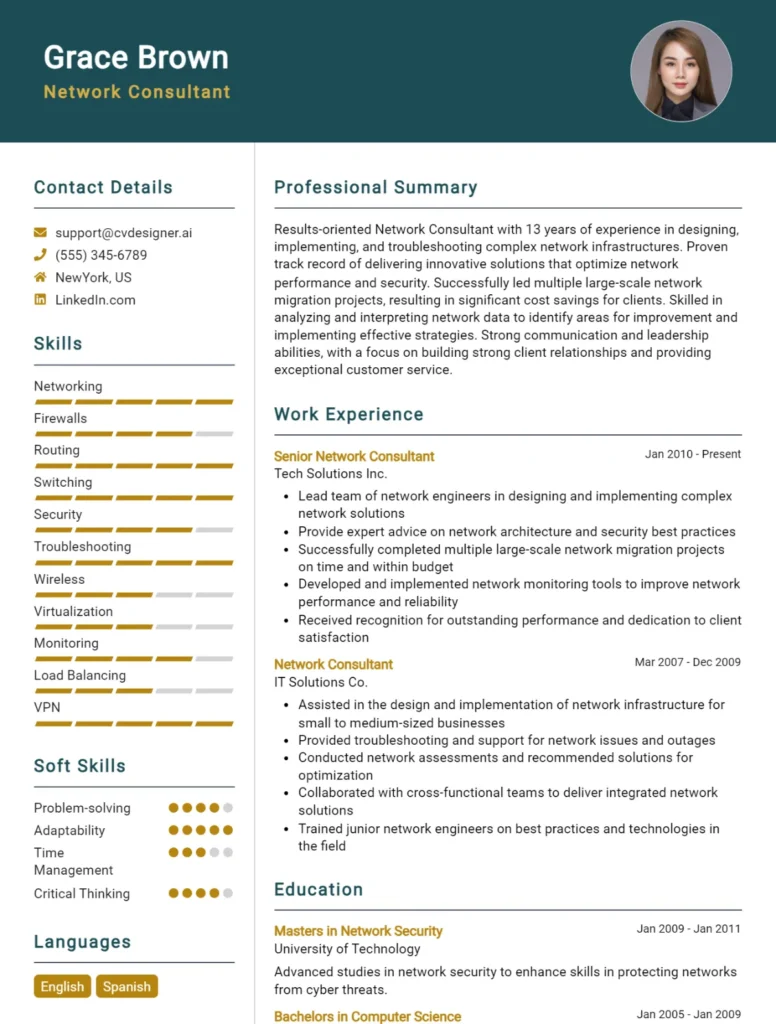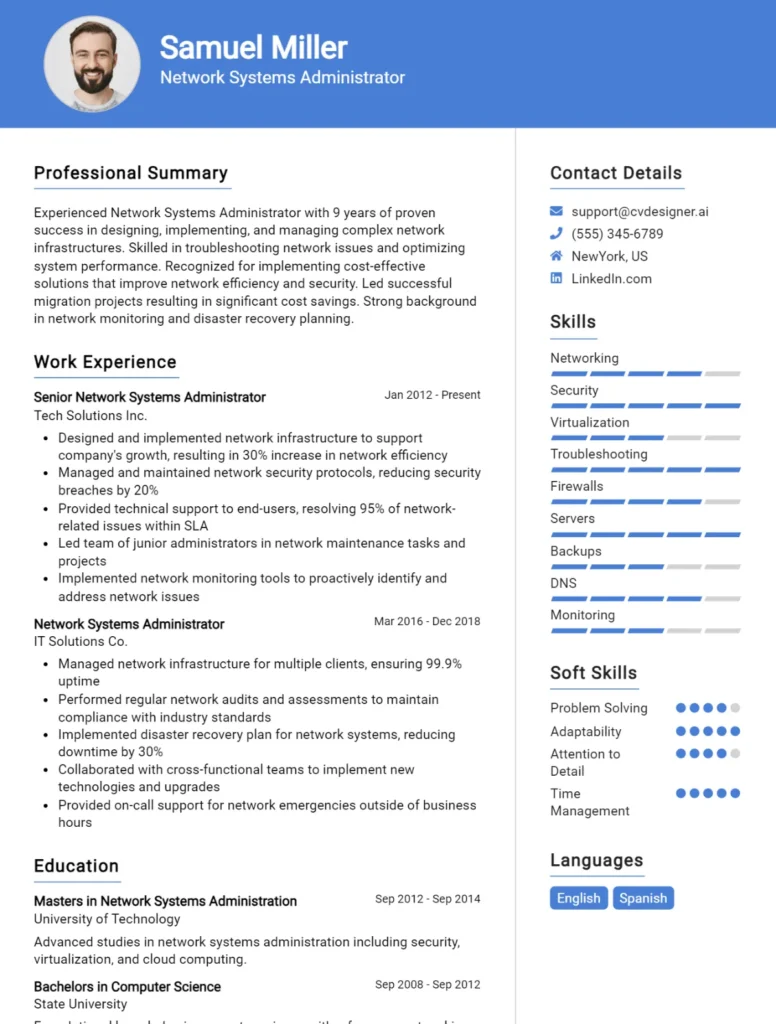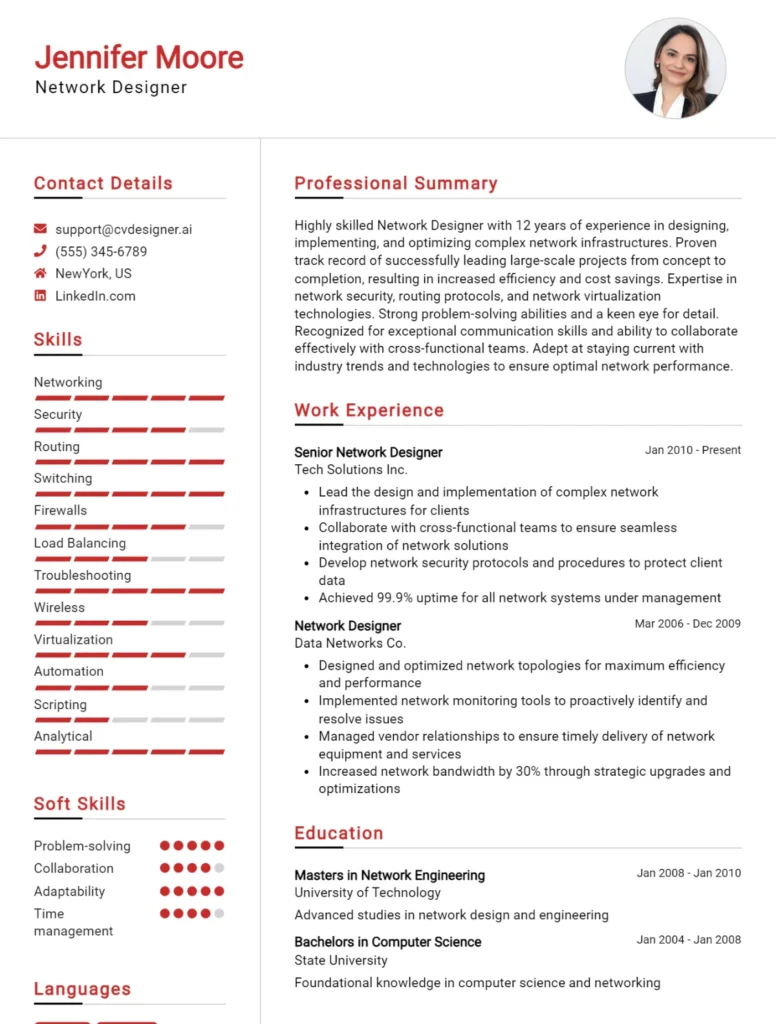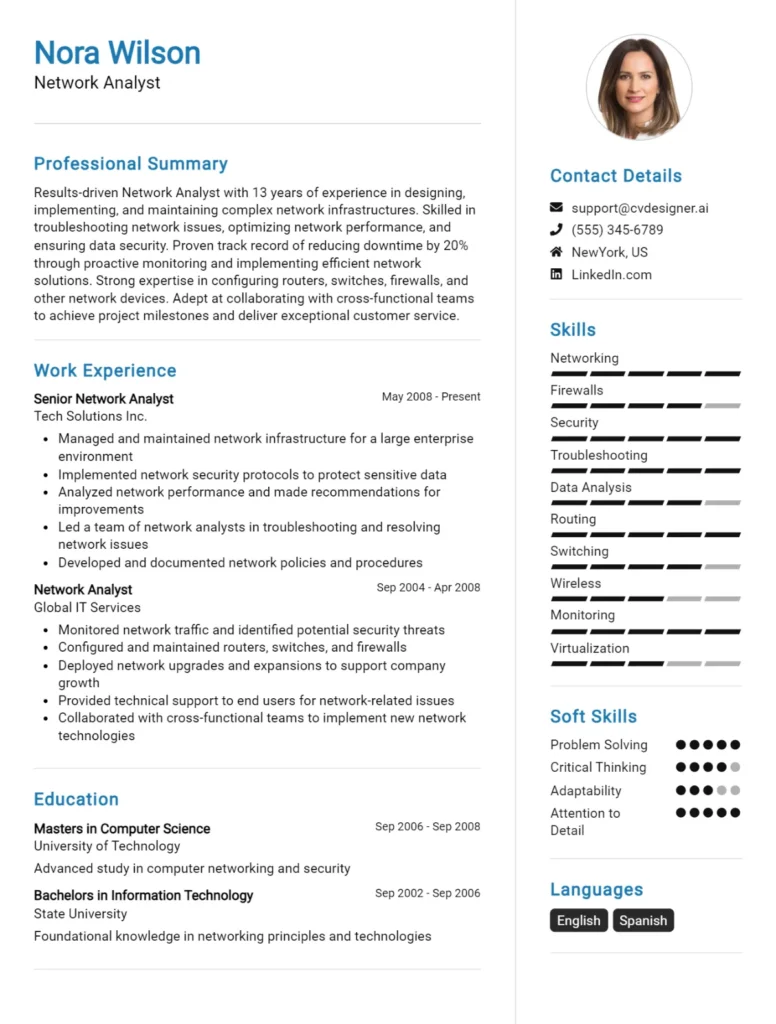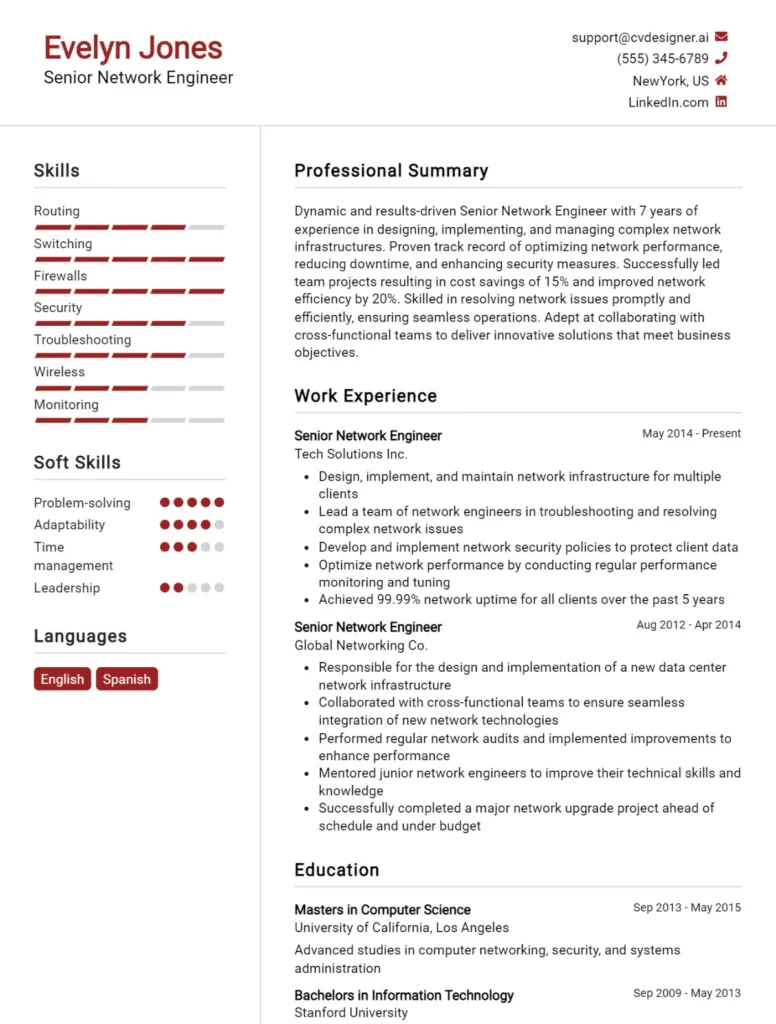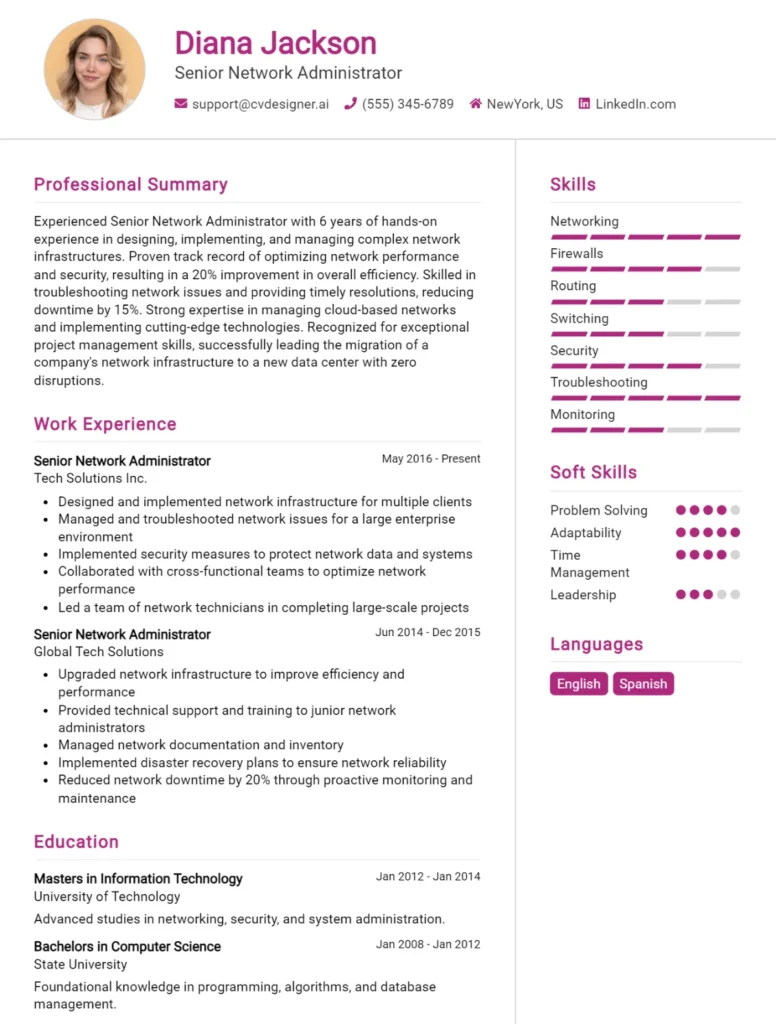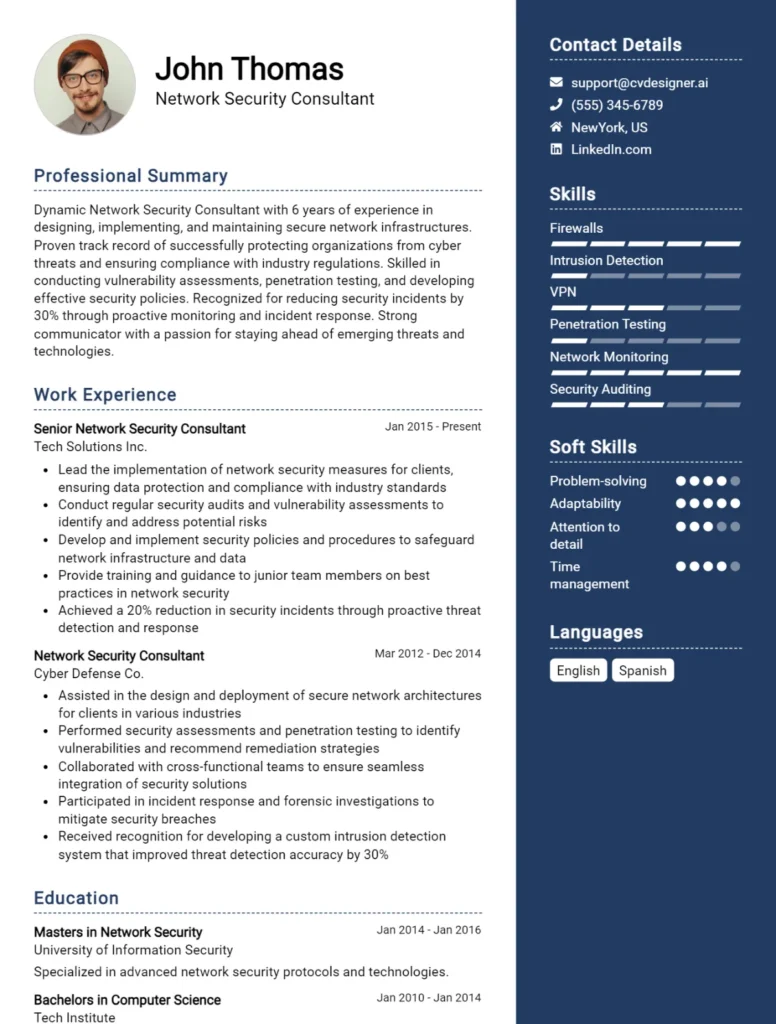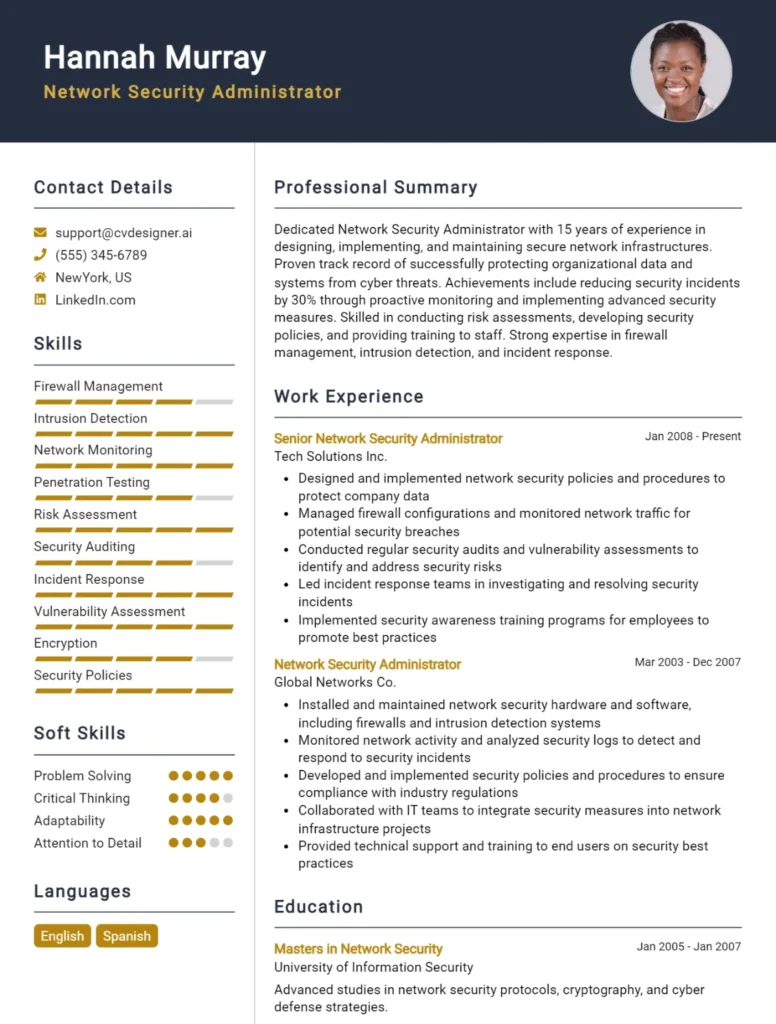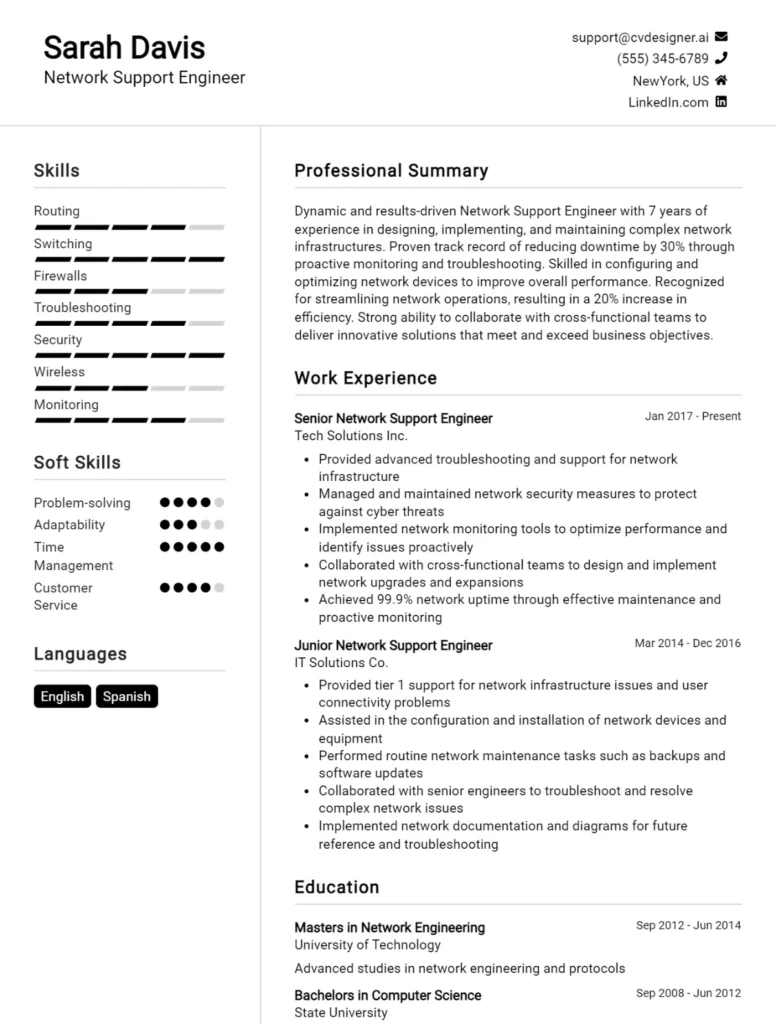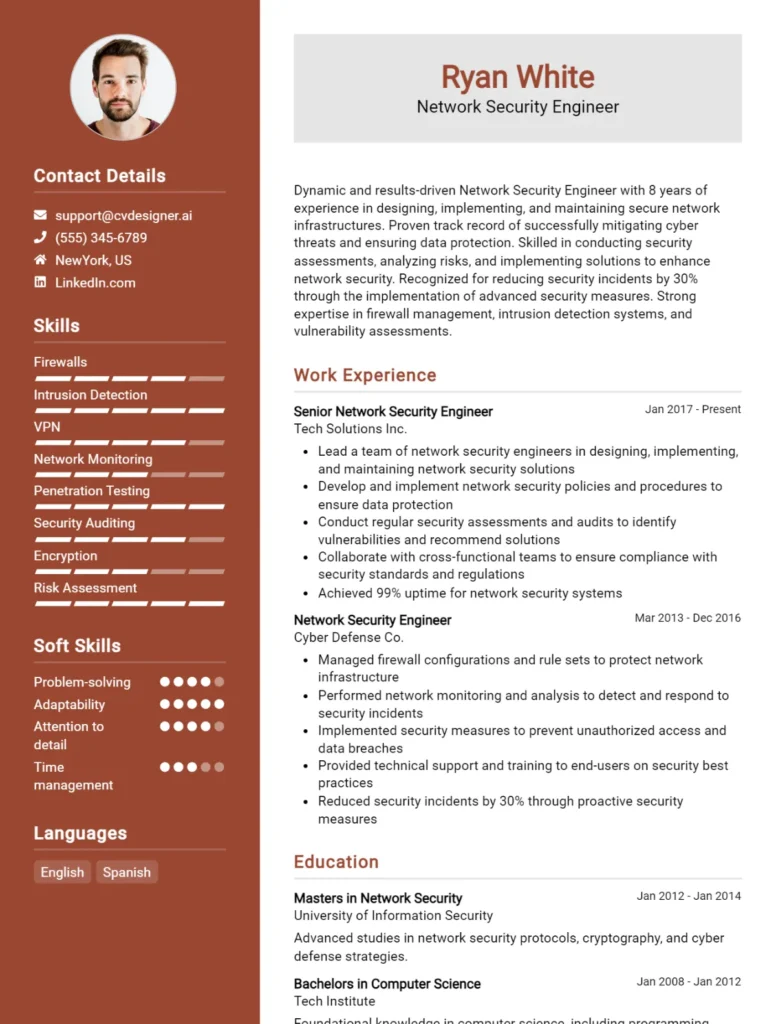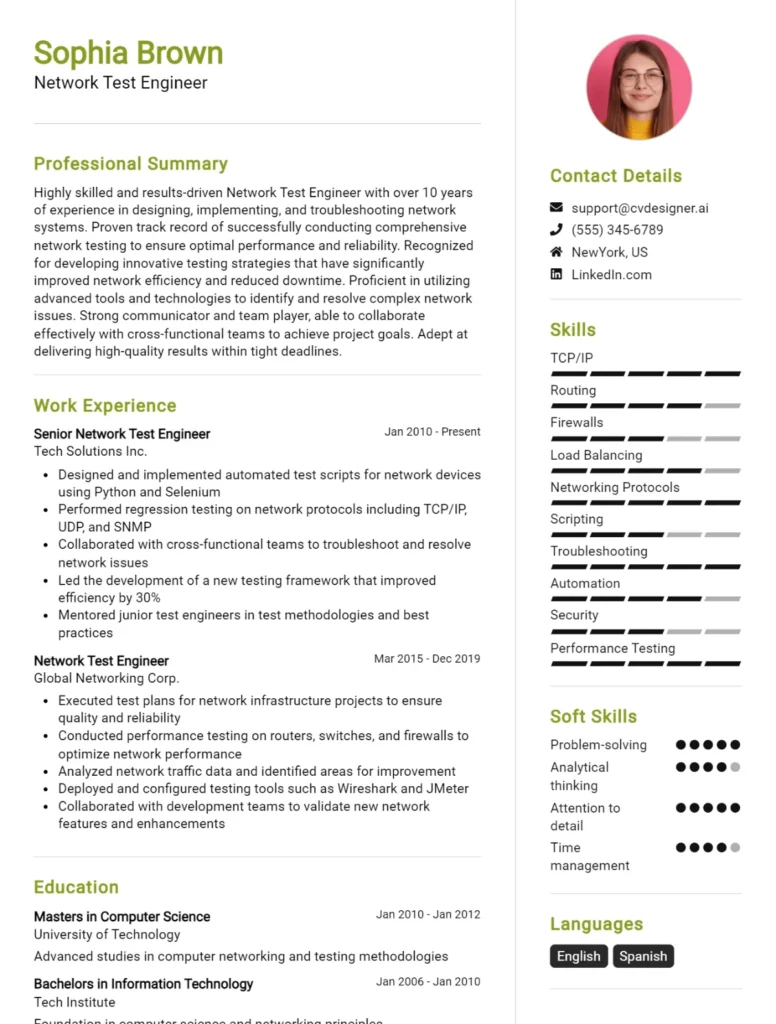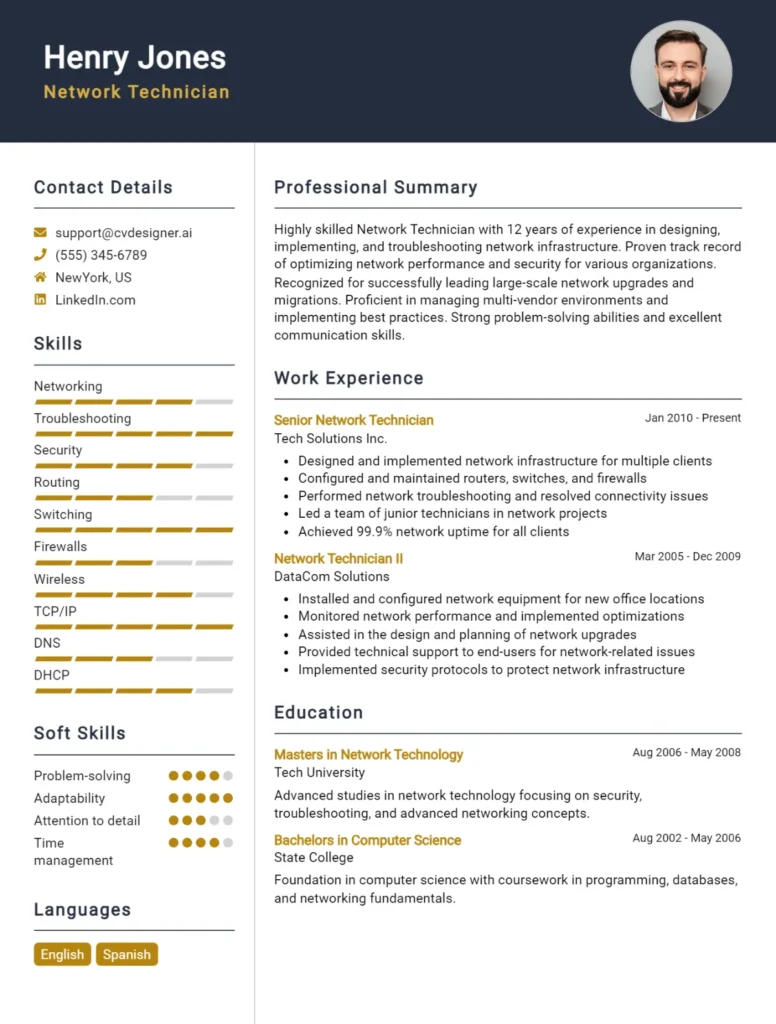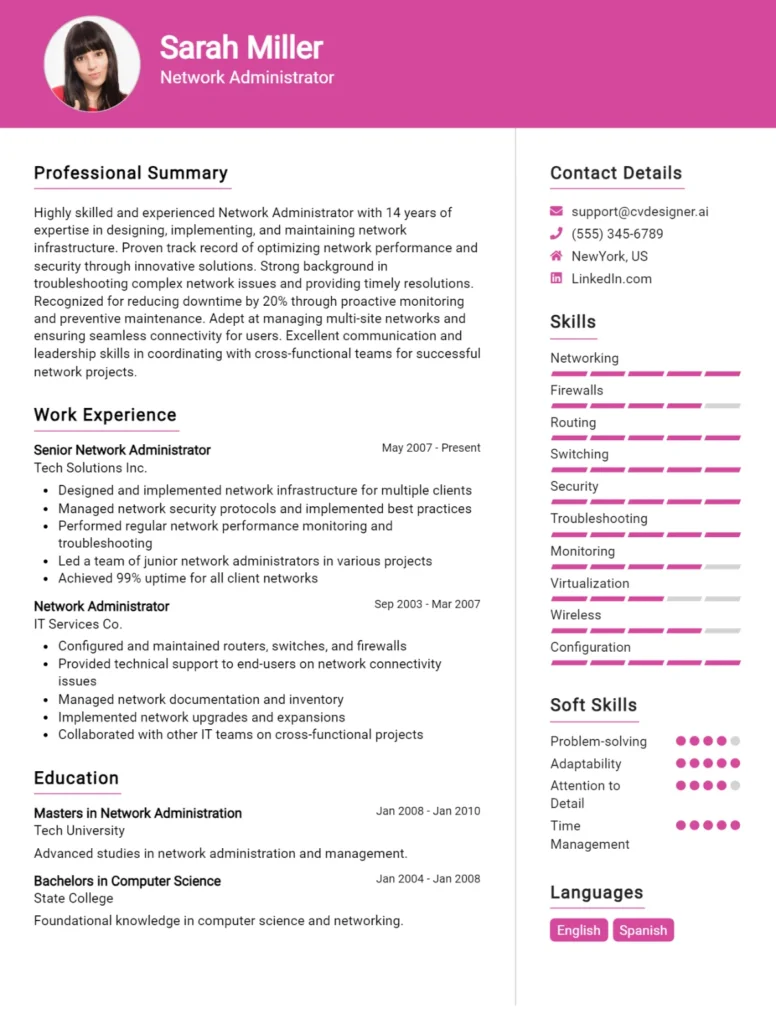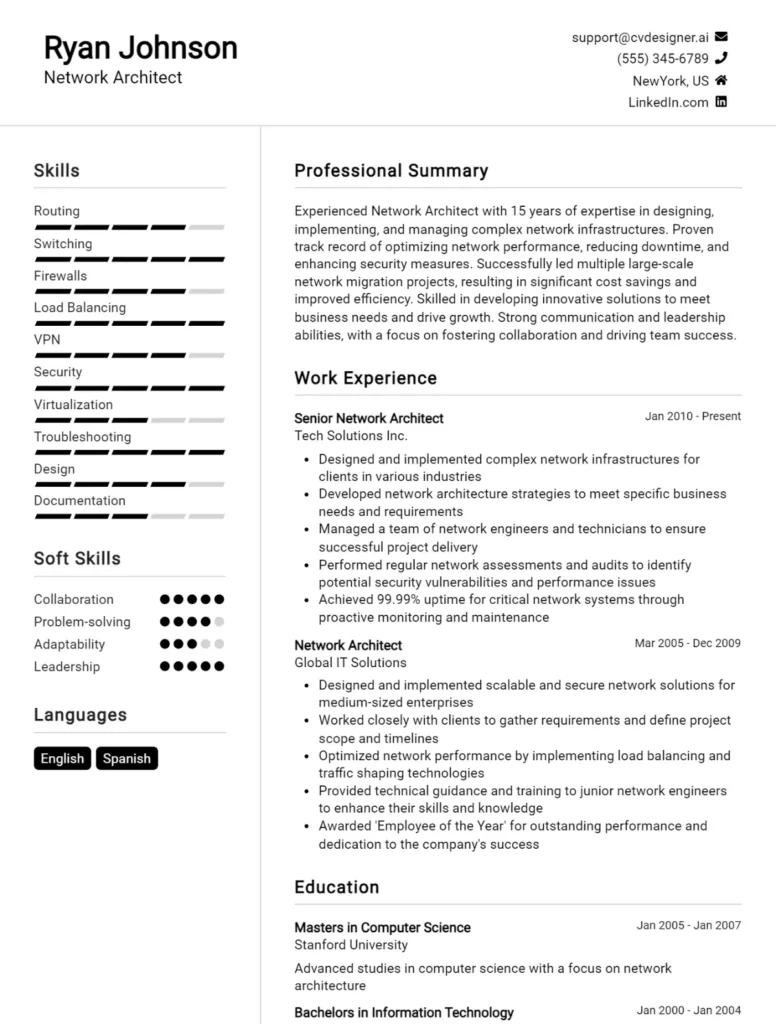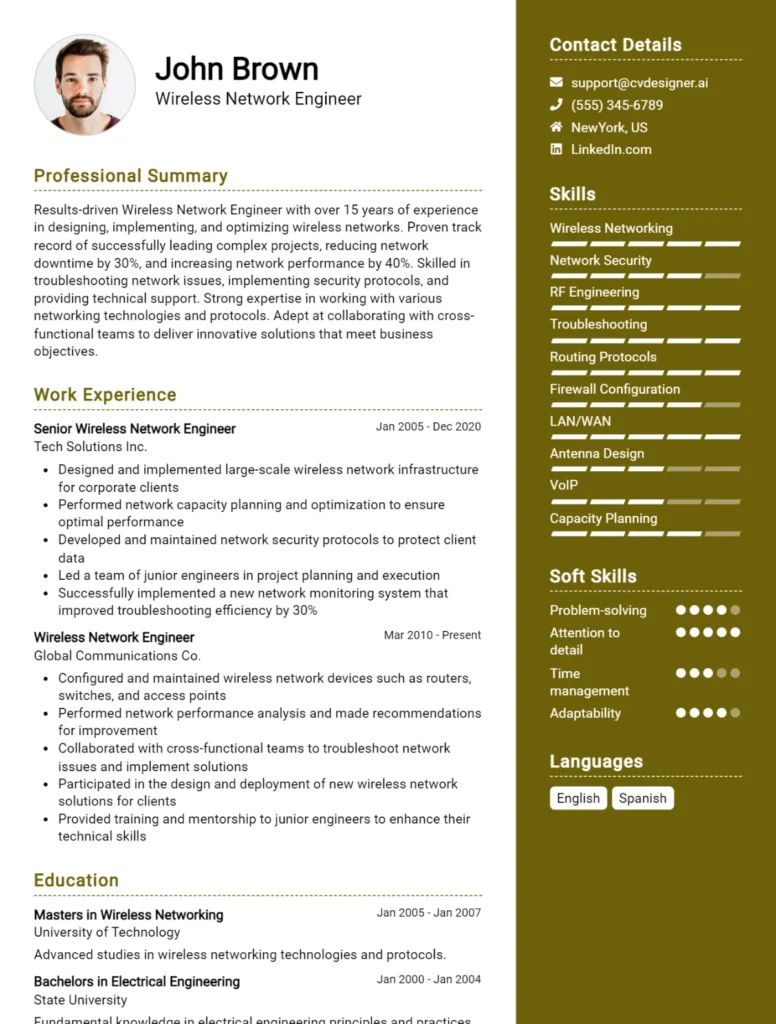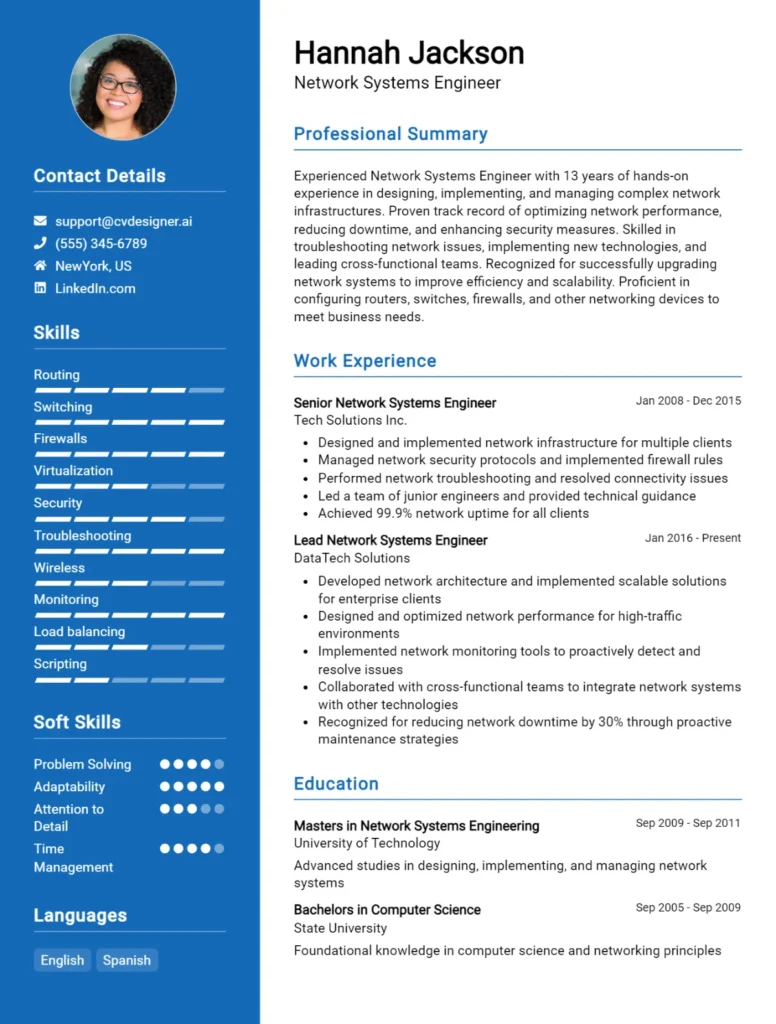Most Popular Network Engineer CV Examples
Explore additional Network Engineer CV samples and guides and see what works for your level of experience or role.
Are you passionate about technology and networking? Do you thrive in a fast-paced environment where problem-solving and critical thinking are key skills? If so, a career as a Network Engineer may be the perfect fit for you. In this comprehensive guide, we will walk you through the essential steps of crafting a top-notch Network Engineer CV that will catch the eye of potential employers. From highlighting your technical skills to showcasing your experience and certifications, we've got you covered. Keep reading for valuable tips and tricks on how to create a standout CV that will land you your dream job in the field of networking.
Key points covered in this article:
- The importance of a well-crafted CV in the competitive job market
- Essential sections to include in your Network Engineer CV
- How to showcase your technical skills and certifications effectively
- Tips for tailoring your CV to specific job roles and companies
- CV examples and templates to inspire your own unique design.
What is a Network Engineer CV?
A Network Engineer CV is a vital document that outlines a professional's skills, qualifications, and experience in the field of networking. It serves as a snapshot of the individual's career trajectory, showcasing their technical expertise, problem-solving abilities, and project management skills. A well-crafted CV not only highlights the candidate's achievements but also demonstrates their suitability for the role they are applying for. By following a CV writing guide like the one provided by CV Designer, Network Engineers can effectively showcase their capabilities and stand out in a competitive job market.
In the highly technical and constantly evolving field of networking, a Network Engineer CV plays a crucial role in securing job opportunities and advancing one's career. Employers rely on CVs to assess a candidate's qualifications and determine if they possess the necessary skills to excel in the role. A comprehensive CV not only showcases the individual's technical proficiency in areas such as network design, implementation, and troubleshooting but also demonstrates their ability to adapt to new technologies and work effectively in a team environment. By following best practices outlined in a CV writing guide, Network Engineers can ensure that their CV effectively communicates their expertise and sets them apart from other applicants.
Key Components of a Network Engineer CV
- Skills: Highlight your technical skills such as knowledge of networking protocols, hardware, and software skills
- Work Experience: Detail your experience in designing, implementing, and maintaining network infrastructures work experience
- Certifications: Include any relevant certifications such as CCNA or CompTIA Network+
- Education: List your degree in a related field such as Computer Science or Information Technology
- Professional Summary: Provide a brief overview of your experience and expertise in network engineering
- Projects: Showcase any projects you have worked on that demonstrate your skills and knowledge in networking
- Problem-Solving Skills: Highlight your ability to troubleshoot and resolve network issues efficiently
- Communication Skills: Emphasize your ability to effectively communicate with team members and clients
- Teamwork: Discuss your experience collaborating with cross-functional teams to achieve network goals
- Leadership: Mention any leadership roles you have held in network engineering projects
- Technical Proficiency: Detail your proficiency in network monitoring tools and troubleshooting techniques
- Professional Development: Include any ongoing training or courses you are taking to stay current in the field of network engineering
Sample Network Engineer CV for Inspiration
[Full Name] [Address] [City, State, Zip Code] [Phone Number] [Email Address]
Professional Summary: Dedicated Network Engineer with over 5 years of experience in designing, implementing, and maintaining network infrastructure. Skilled in troubleshooting network issues and optimizing network performance to meet business objectives. Strong background in Cisco networking technologies and a proven track record of successful project management.
Work Experience:
Network Engineer ABC Company, City, State June 2017 - Present
- Designed and implemented network architecture to support company's growing needs
- Configured and maintained routers, switches, and firewalls to ensure network security
- Conducted regular network performance monitoring and implemented necessary upgrades to improve efficiency
- Collaborated with cross-functional teams to troubleshoot and resolve network issues in a timely manner
Network Technician XYZ Company, City, State January 2015 - May 2017
- Assisted in the deployment and configuration of network equipment
- Conducted network audits to identify potential vulnerabilities and recommended solutions
- Provided technical support to end-users to resolve network-related issues
- Documented network configurations and updated network diagrams as needed
Education:
Bachelor's Degree in Computer Science University Name, City, State Graduation Year
Skills:
- Proficient in Cisco networking technologies (CCNA certified)
- Strong knowledge of TCP/IP, LAN/WAN protocols, and network security principles
- Experience with network monitoring tools such as Wireshark and SolarWinds
- Excellent problem-solving and communication skills
- Project management experience in network infrastructure projects
Publications:
- Co-authored a research paper on network optimization strategies in a leading industry journal
Certifications:
- Cisco Certified Network Associate (CCNA)
References available upon request.
Network Engineer CV Writing Tips
When writing your CV as a Network Engineer, it is important to highlight your technical skills and experience in designing, implementing, and managing network systems. Be sure to demonstrate your ability to troubleshoot and resolve network issues efficiently. Tailor your CV to showcase your certifications and training in networking technologies, as well as your experience working with various networking tools and equipment. Additionally, emphasize your communication skills and ability to work collaboratively with team members.
Specific tips for writing a Network Engineer CV:
- Clearly outline your technical skills, including proficiency in networking protocols, hardware, and software.
- Highlight your experience in network design, implementation, and maintenance.
- Include any relevant certifications such as CCNA, CCNP, or CompTIA Network+.
- Use action verbs to describe your accomplishments and responsibilities in previous network engineering roles.
- Showcase your problem-solving abilities and successful project outcomes.
- Provide examples of your ability to work under pressure and meet tight deadlines.
- Quantify your achievements where possible, such as reducing network downtime or improving network performance.
- Proofread your CV carefully to ensure it is free of errors and presents a professional image.
Network Engineer CV Summary Examples
- Experienced Network Engineer with over 8 years of hands-on experience in designing, implementing, and maintaining complex network infrastructures. Skilled in troubleshooting, optimizing performance, and ensuring network security. Proven track record of successfully managing large-scale projects and collaborating with cross-functional teams to deliver high-quality solutions.
- Detail-oriented Network Engineer with a strong background in configuring and managing routers, switches, firewalls, and other networking devices. Proficient in network protocols, routing protocols, and network monitoring tools. Excellent communication skills and a proactive approach to problem-solving make me a valuable asset to any IT team.
- Certified Network Engineer with a passion for staying up-to-date on the latest networking technologies and trends. Skilled in network design, implementation, and administration, with a focus on maximizing efficiency and reliability. Proven ability to work independently or as part of a team to meet project deadlines and exceed client expectations.
- Results-driven Network Engineer with a proven ability to analyze complex network requirements and develop innovative solutions to meet business needs. Strong knowledge of network security best practices and experience implementing security measures to protect data and prevent unauthorized access. Adept at working under pressure and adapting to changing priorities in a fast-paced environment.
- Seasoned Network Engineer with a solid foundation in network architecture, configuration, and troubleshooting. Proficient in managing multi-vendor environments and integrating new technologies into existing networks. Strong problem-solving skills and a dedication to continuous learning and professional development. A collaborative team player who thrives in a dynamic work environment.
Build a Strong Experience Section for Your Network Engineer CV
As a Network Engineer, I have a proven track record of designing, implementing, and maintaining network infrastructures to ensure seamless connectivity and optimal performance for organizations. With a strong foundation in networking principles and technologies, I have successfully managed complex projects and resolved challenging issues to enhance operational efficiency. Below are examples of my work experience descriptions:
- Designed and implemented secure and scalable network solutions for a multinational corporation, resulting in improved data transmission speeds and reduced downtime.
- Conducted network assessments and audits to identify vulnerabilities and implemented proactive measures to enhance network security and compliance with industry regulations.
- Collaborated with cross-functional teams to troubleshoot network issues and provide timely resolutions, resulting in minimal disruptions to business operations.
- Configured and optimized network devices, including routers, switches, and firewalls, to ensure proper traffic routing and seamless connectivity for end users.
- Implemented network monitoring tools to proactively identify potential issues and optimize network performance, resulting in increased uptime and improved user experience.
- Led migration projects to transition legacy network infrastructures to modern technologies, reducing operational costs and enhancing system reliability.
- Conducted performance testing and capacity planning to anticipate network growth and scalability requirements, ensuring seamless expansion without compromising performance.
- Provided training and support to internal teams on network best practices and technologies, empowering them to effectively manage and troubleshoot network issues independently.
Network Engineer CV Education Examples
As a Network Engineer, having a strong educational background is crucial in order to excel in this field. Here are some examples of educational backgrounds that are relevant to a Network Engineer:
- Bachelor's degree in Computer Science or Information Technology: A degree in computer science or IT provides a strong foundation in networking principles, protocols, and technologies that are essential for a Network Engineer.
- Master's degree in Network Engineering: A specialized master's degree in network engineering focuses on advanced networking concepts, network design, and troubleshooting techniques, making it an ideal educational background for a Network Engineer.
- Cisco Certified Network Associate (CCNA) certification: While not a traditional degree, obtaining a CCNA certification demonstrates a deep understanding of networking fundamentals and is highly valued in the industry.
- Bachelor's degree in Electrical Engineering: A degree in electrical engineering provides a comprehensive understanding of network infrastructure, communication systems, and signal processing, which are all relevant skills for a Network Engineer.
- CompTIA Network+ certification: Similar to the CCNA certification, obtaining a CompTIA Network+ certification demonstrates knowledge and skills in networking concepts, network operations, and security, making it a valuable educational background for a Network Engineer.
Skills to Highlight in Your Network Engineer CV
As a Network Engineer, it is essential to showcase a mix of both soft and hard skills on your CV to demonstrate your ability to effectively manage and optimize network systems. Soft skills are important for communication, teamwork, and problem-solving, while hard skills are crucial for technical expertise and proficiency in specific tools and technologies. Here are 10 soft skills and 10 hard skills that you should highlight in your Network Engineer CV:
Soft Skills:
- Strong communication skills
- Excellent problem-solving abilities
- Team player mentality
- Adaptability and flexibility
- Attention to detail
- Time management skills
- Customer service orientation
- Leadership capabilities
- Analytical thinking
- Conflict resolution skills
Hard Skills:
- Proficiency in network protocols (TCP/IP, DNS, DHCP)
- Experience with network monitoring tools (Wireshark, Nagios)
- Knowledge of routing and switching technologies (Cisco, Juniper)
- Firewall configuration and management
- VPN implementation and troubleshooting
- Network security best practices
- Wireless networking concepts
- Virtualization technologies (VMware, Hyper-V)
- Scripting languages (Python, PowerShell)
- Experience with cloud platforms (AWS, Azure)
Network Engineer CV Format
As a Network Engineer, having a well-structured CV is essential to showcase your skills and experiences in the field of networking. When it comes to formatting your CV, it is important to highlight your technical abilities, certifications, and relevant experience in a clear and concise manner.
For entry-level Network Engineers, it is recommended to start with a brief summary of your education and any relevant internships or projects. Follow this with a section on technical skills, certifications, and any relevant coursework.
For mid-level Network Engineers, focus on highlighting your hands-on experience with networking technologies, any leadership roles you have held, and any specific projects you have worked on.
For senior Network Engineers, emphasize your leadership and project management skills, as well as any industry certifications or awards you have received.
When formatting your CV, consider using a clean and professional layout with clear headings and bullet points to make it easy for recruiters to scan. Be sure to include keywords related to networking technologies and industry standards to make your CV stand out.
Here are some key bullet points to include in your Network Engineer CV:
- Summary of technical skills and certifications
- Hands-on experience with networking technologies such as Cisco, Juniper, and Palo Alto
- Experience with network design, implementation, and troubleshooting
- Strong communication and problem-solving skills
- Knowledge of industry standards and protocols
- Any relevant education or training in networking technologies
For more tips on CV formatting, check out this cv format guide.
Common Mistakes to Avoid in a Network Engineer CV
As a network engineer, having a strong CV is crucial in showcasing your skills and experience to potential employers. To ensure your CV stands out for all the right reasons, it's important to avoid some common mistakes that many candidates make. Here are 8-10 common mistakes to avoid in a Network Engineer CV:
- Using generic job titles instead of specific ones related to networking
- Focusing too much on technical skills and neglecting soft skills and certifications
- Including irrelevant work experience or hobbies that are not related to networking
- Using a cluttered or hard-to-read format that makes it difficult for employers to quickly scan your CV
- Not tailoring your CV to the specific job you are applying for
- Failing to quantify your accomplishments and provide specific examples of your achievements
- Including outdated or irrelevant technology skills
- Not proofreading your CV for spelling and grammar errors
- Omitting important details such as relevant projects, certifications, and training courses
- Using a generic objective statement instead of a tailored summary that highlights your unique qualifications and goals
Key Takeaways for a Network Engineer CV
- Utilize a professional CV template to showcase your skills and experience effectively. CV Templates
- Highlight your technical expertise in networking technologies such as TCP/IP, DNS, and routing protocols.
- Include certifications such as CCNA or CCNP to demonstrate your knowledge and commitment to the field.
- Showcase your experience with network design, implementation, and troubleshooting.
- Quantify your achievements with specific examples of successful network projects or improvements.
- Use strong action verbs to describe your responsibilities and accomplishments in each role.
- Customize your CV for each job application to highlight relevant experience and skills.
- Utilize a cover letter template to introduce yourself and explain why you are the perfect fit for the network engineer position. Cover Letter Templates
- Include a technical skills section listing your proficiency with network monitoring tools, security protocols, and hardware.
- Demonstrate your ability to work collaboratively with cross-functional teams to achieve project goals.
- Use metrics to quantify the impact of your work, such as improved network performance or reduced downtime.
- Consider using a CV builder tool to create a professional and visually appealing resume. CV Builder
Build your CV in minutes
Use an AI-powered cv builder and have your cv done in 5 minutes. Just select your template and our software will guide you through the process.
